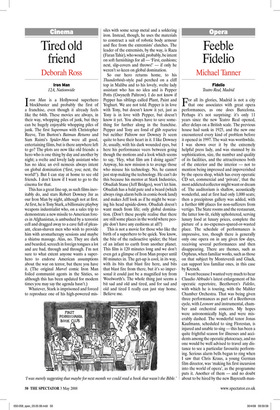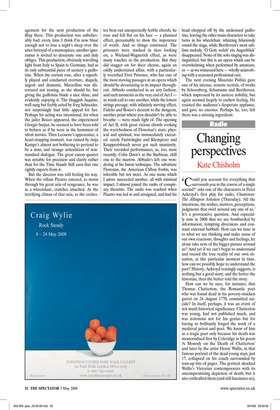Feeble Fidelio
Michael Tanner
Fidelio Teatro Real, Madrid For all its glories, Madrid is not a city that one associates with great opera performances, as one does Barcelona. Perhaps it’s not surprising: it’s only 11 years since the new Teatro Real opened, after delays on a British scale. The previous house had sunk in 1925, and the new one encountered every kind of problem before it opened in 1997. The wait was worthwhile. I was shown over it by the extremely helpful press lady, and was stunned by its sophistication, size, the number and quality of its facilities, and the attractiveness both of the exterior and the interior — not to mention being impressed and impoverished by the opera shop, which has every operatic CD set, commercial and ‘private’, that the most addicted collector might want or dream of. The auditorium is shallow, acoustically wonderful, and at first had only 1,000 seats; then a precipitous gallery was added, with a further 600 places for non-sufferers from vertigo. The State rooms and the restaurant, the latter low-lit, richly upholstered, serving luxury food at luxury prices, complete the picture of a no-expenses-spared-or-wasted place. The schedule of performances is impressive, too, though there is generally only one opera on in any given few days, receiving several performances and then disappearing. There are themes, such as Orpheus, when familiar works, such as those on that subject by Monteverdi and Gluck, can support less familiar ones, in this case by Krenek.
I went because I wanted very much to hear Claudio Abbado’s latest enlargement of his operatic repertoire, Beethoven’s Fidelio, with which he is touring, with the Mahler Chamber Orchestra. That was being given three performances as part of a Beethoven cycle, with Leonore and instrumental, chamber and orchestral concerts. My hopes were astronomically high, and were miserably dashed. The wonderful tenor Jonas Kaufmann, scheduled to sing Florestan, is injured and unable to sing — this has been a quite frightful season for illnesses and accidents among the operatic plutocracy, and no one would be well advised to travel any distance to see a particular favourite performing. Serious alarm bells began to ring when I saw that Chris Kraus, a young German film director, was ‘making his first incursion into the world of opera’, as the programme puts it. Another of them — and no doubt about to be hired by the new Bayreuth man agement for the next production of the Ring there. This production was unbelievably bad; every time I think I’m now blasé enough not to lose a night’s sleep over the utter betrayal of a masterpiece, another ignoramus is invited to desecrate one and duly obliges. This production, obviously travelling light from Italy to Spain to Germany, had as its only substantial piece of scenery a guillotine. When the curtain rose, after a superbly played and conducted overture, shapely, urgent and dramatic, Marzelline was discovered not ironing, as she should be, but giving the guillotine blade a nice shine, and evidently enjoying it. The thuggish Jaquino, well sung but feebly acted by Jorg Schneider, not surprisingly had little appeal for her. Perhaps his acting was intentional, for when the jailer Rocco appeared, the experienced Giorgio Surjan, he seemed to have been told to behave as if he were in the hammiest of silent movies. Then Leonore’s appearance, a heart-stopping moment, was ruined by Anja Kampe’s almost not bothering to pretend to be a man, and strange articulation of nonstandard dialogue. The great canon quartet was notable for precision and clarity rather than for the Time Stands Still aura that one rightly expects from it.
But the director was still feeling his way. When the villain Pizarro entered, to storm through his great aria of vengeance, he was in a wheelchair, crutches attached. At the terrifying climax of that aria, as the orches tra beat out unexpectedly feeble chords, he rose and fell flat on his face — a planned effect, presumably to show the impotence of wrath. And so things continued. The prisoners were stacked in tiers looking on, a Wieland-Wagnerish effect, as were many touches in the production. But they did stagger on for their chorus, again an oddly understated affair, with a particularly wretched First Prisoner, who has one of the most moving passages in an opera which should be devastating in its impact throughout. Abbado conducted in an airy fashion, and such moments as the very end of Act I — as winds call to one another, while the lowest strings presage, with infinitely moving effect, Fidelio and Rocco’s descent to the dungeon, another point where you shouldn’t be able to breathe — were made light of. The opening of Act II, with great vicious chords evoking the wretchedness of Florestan’s state, physical and spiritual, was immaculately executed: surely Furtwängler and Klemperer and Knappertsbusch never got such unanimity. Their recorded performances, as, too, most recently, Colin Davis’s at the Barbican, chill one to the marrow. Abbado’s left one wondering at his baton technique. The substitute Florestan, the American Clifton Forbis, was tolerable but not more. As one scene which I adore succeeded another, all with minimal impact, I almost joined the ranks of conspiracy theorists. The nadir was reached when Pizarro was led in and arraigned, and had his head chopped off by the underused guillotine, leaving the other main characters to take turns in his wheelchair, whizzing hilariously round the stage, while Beethoven’s most sublime melody, ‘O Gott, welch’ ein Augenblick’ disappeared. None of the solo singing was distinguished, but this is an opera which can be overwhelming when performed by amateurs, or — as we witnessed here — wholly uninvolving with a seasoned professional cast.
The next evening Maurizio Pollini gave one of his intense, remote recitals, of works by Schoenberg, Schumann and Beethoven, which impressed by its austere nobility, but again seemed largely to eschew feeling. He resisted the audience’s desperate applause, and gave no encores. Perhaps he, too, felt there was a missing ingredient.



















































































 Previous page
Previous page